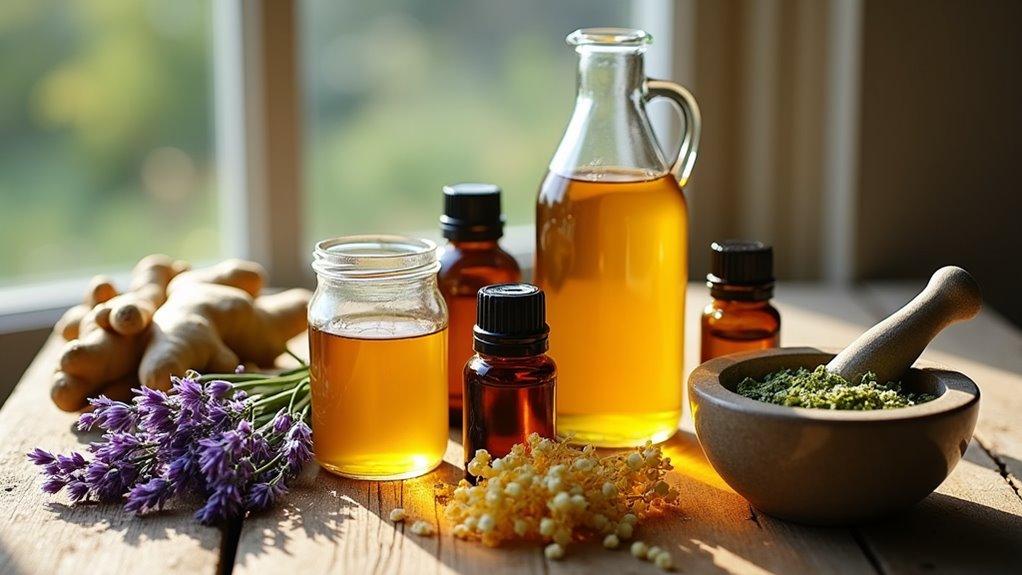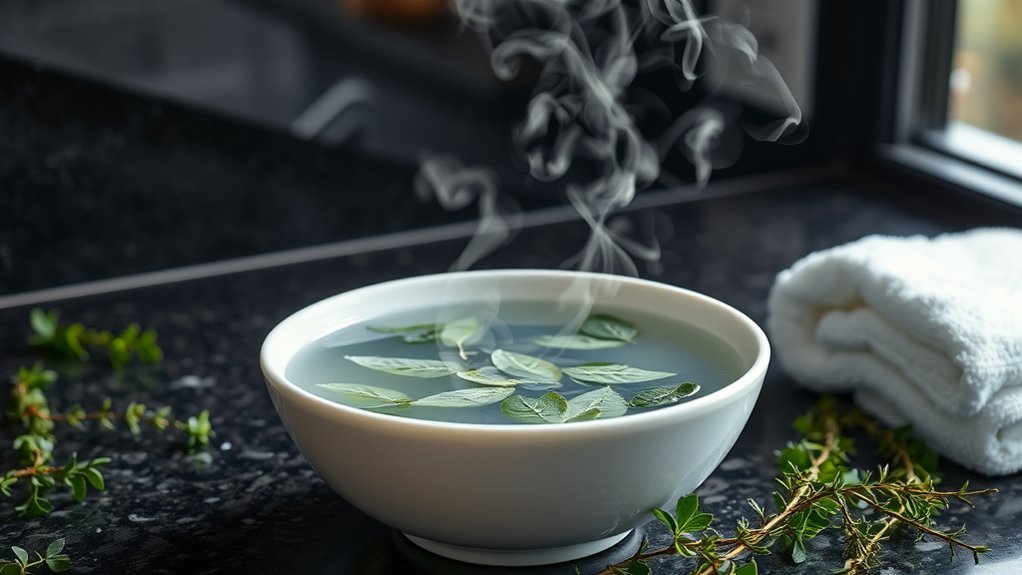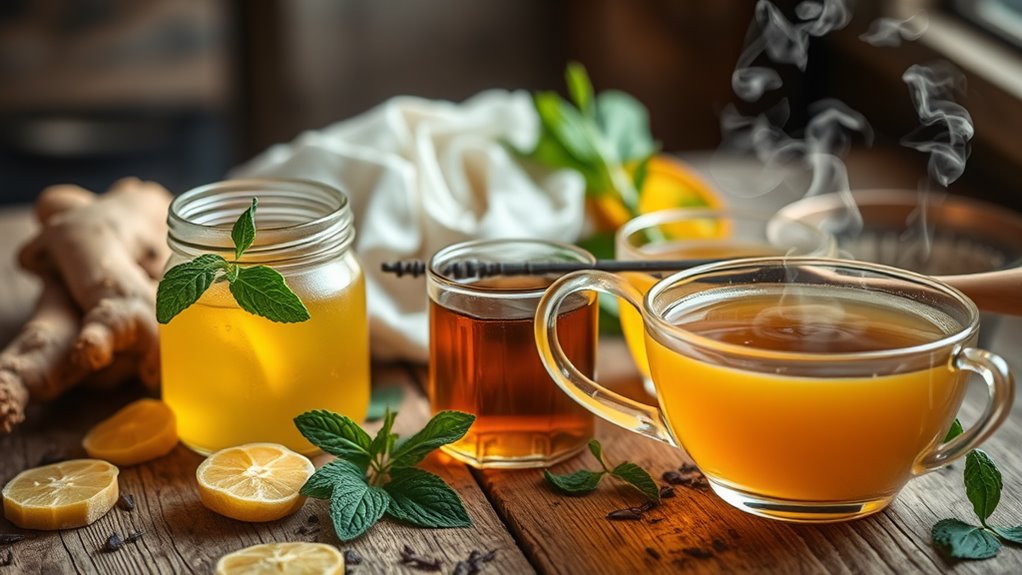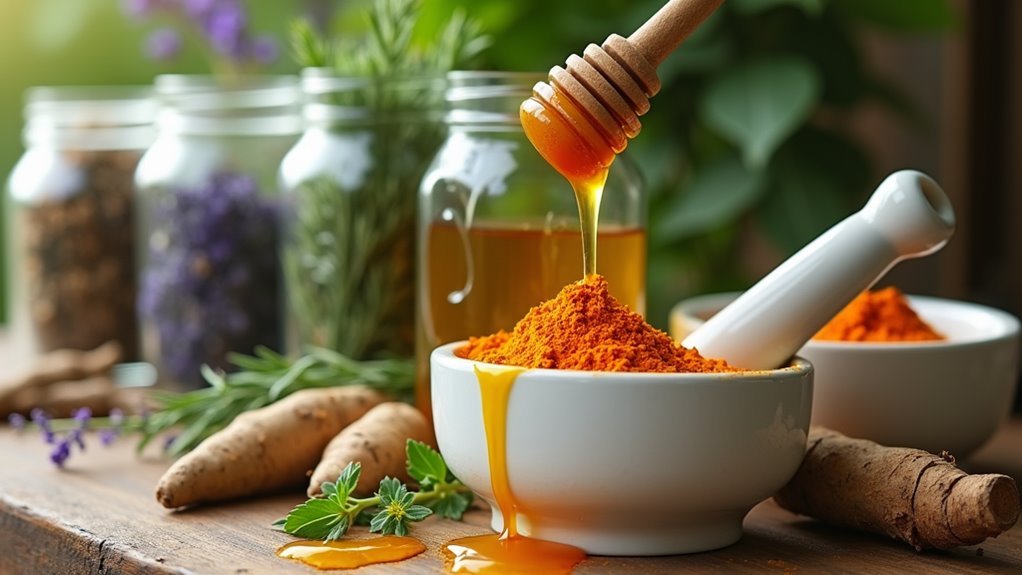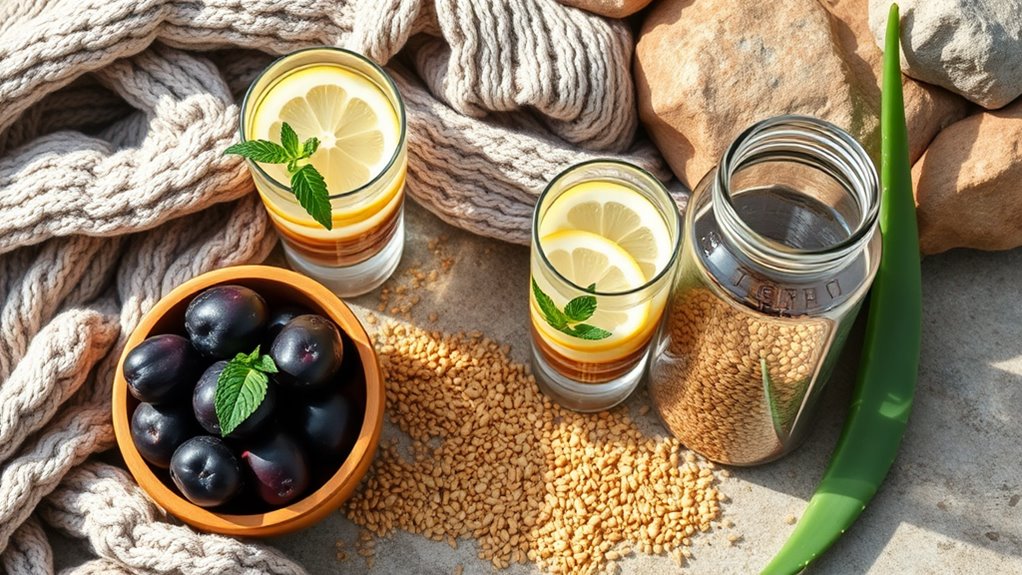Natural Healing Remedies Everyone Should Know!
You’ll discover powerful natural remedies right in your kitchen and garden that can transform your health. From immune-boosting elderberry and antibacterial raw honey to calming chamomile tea and inflammation-fighting turmeric, nature provides effective solutions for common ailments. Essential oils like lavender and peppermint offer relief for sleep issues and headaches, while herbs like thyme and oregano pack potent healing properties. There’s a whole world of traditional healing wisdom waiting to enhance your wellbeing.
Key Takeaways
-
Raw honey and garlic act as natural antibiotics, with Manuka honey offering exceptional antibacterial properties for wound healing and immune support.
-
Lavender essential oil reduces anxiety and promotes better sleep when used in diffusers or diluted for massage.
-
Ginger and turmeric combine powerful anti-inflammatory properties, especially effective when consumed as tea or added to foods.
-
Oregano oil provides strong antimicrobial benefits, helping fight infections when used properly with carrier oils.
-
Chamomile tea offers multiple benefits, including stress reduction, improved sleep quality, and digestive comfort.
Ancient Healing Wisdom for Modern Times
While modern medicine continues to advance, ancient healing practices have stood the test of time and offer valuable wisdom for today’s health challenges.
You’ll find that many natural healing remedies used by our ancestors remain relevant and effective today. From the calming properties of chamomile to the immune-boosting power of elderberry, these time-tested solutions connect you to centuries of healing knowledge.
Your journey into traditional wellness practices doesn’t mean rejecting modern medicine – it’s about embracing a holistic approach to health that has nourished generations before us.
The Power of Kitchen Herbs in Natural Medicine
Although many people search far and wide for healing solutions, some of nature’s most potent medicines can be found right in your kitchen spice rack. Common herbs like thyme and oregano pack powerful antibacterial properties, while ginger and turmeric reduce inflammation naturally.
You’ll find that cinnamon helps regulate blood sugar, and rosemary improves memory and concentration.
You don’t need to be an expert herbalist to harness these natural healers. Start by adding fresh basil to reduce stress, or steep peppermint to ease digestive discomfort.
Sage can help soothe sore throats, while garlic strengthens your immune system. These kitchen allies have supported human health for thousands of years, and they’re ready to support yours too.
Join countless others who’ve discovered that healing power often comes in the simplest, most accessible forms.
Essential Oils: Nature’s Medicine Cabinet
Beyond kitchen herbs lies another powerful domain of plant-based healing: concentrated plant oils that capture nature’s most potent medicinal properties.
You’ll find these essential oils offer targeted solutions for common ailments while connecting you to ancient healing traditions used across cultures for generations.
Start with versatile oils like lavender for sleep and anxiety, peppermint for headaches and digestion, and tea tree for its antimicrobial properties.
You can blend these oils with carrier oils for massage, add them to your diffuser for aromatherapy, or create your own healing salves.
Just remember that these concentrated botanicals are powerful – always dilute them properly and research safe usage guidelines before applying them.
Soon you’ll discover why so many health-conscious individuals trust essential oils as their natural medicine cabinet.
Honey and Its Therapeutic Properties
Did you know that honey has been revered as both food and medicine since ancient times? This golden elixir isn’t just delicious – it’s packed with antibacterial, anti-inflammatory, and antioxidant properties that can support your natural healing journey.
You’ll find honey particularly effective for soothing sore throats, calming coughs, and healing minor wounds. Its natural sugars provide sustained energy, while its enzymes aid digestion.
When you’re looking for the most therapeutic benefits, choose raw, unprocessed honey from local beekeepers.
Don’t forget to add a spoonful to your daily wellness routine! Mix it into warm tea, spread it on toast, or apply it directly to minor cuts and burns.
Just remember, children under one year shouldn’t consume honey due to botulism risk.
Healing Benefits of Apple Cider Vinegar
While many natural remedies come and go, apple cider vinegar has stood the test of time as a versatile healing tonic. You’ll find this ancient remedy in countless households, trusted for its remarkable health benefits. From supporting digestion to helping maintain healthy blood sugar levels, it’s a true wellness powerhouse.
| Benefit | How to Use |
|---|---|
| Weight Management | 1 tbsp in water before meals |
| Blood Sugar Control | 2 tsp with meals |
| Digestive Aid | 1 tbsp in warm water |
| Skin Health | Diluted as a toner |
| Immune Support | Morning wellness shot |
Mix it into your daily routine by adding a tablespoon to warm water each morning. Remember to always dilute it, as raw vinegar can be harsh on your teeth and throat. For best results, choose organic, unfiltered apple cider vinegar with “the mother.”
Traditional Chinese Medicine Remedies
With roots dating back over 2,500 years, Traditional Chinese Medicine (TCM) offers a holistic approach to healing through herbs, acupuncture, and mindful practices.
You’ll find powerful remedies like ginger for digestive issues, ginseng for energy, and astragalus for immune support. These time-tested solutions can complement your modern wellness routine.
TCM’s philosophy centers on balancing your body’s qi (vital energy) through various methods.
You can try acupuncture to relieve pain and stress, practice tai chi for flexibility and mental clarity, or use cupping therapy to improve circulation. Many of these treatments are now backed by scientific research.
To get started with TCM, consult a licensed practitioner who can create a personalized treatment plan based on your specific needs and health goals.
Ayurvedic Home Treatments
Ancient Indian Ayurvedic medicine offers three powerful ways to enhance your health at home: proper diet, herbal remedies, and daily routines called dinacharya.
You’ll find balance through eating according to your dosha (body type), whether you’re Vata, Pitta, or Kapha. Try warming turmeric milk for inflammation, or ginger tea for digestion. These simple kitchen ingredients can transform your well-being.
Your daily routine should include tongue scraping, oil pulling with coconut or sesame oil, and self-massage with warm oils. These practices aren’t just ancient traditions – they’re scientifically proven to boost immunity and reduce stress.
Remember to align your activities with nature’s cycles. Wake up before sunrise, eat your main meal at noon, and wind down as the sun sets.
You’re not just following a health routine; you’re embracing a time-tested wisdom tradition.
Natural Pain Relief Solutions
Because pain affects everyone differently, finding natural relief solutions that work for your specific needs is essential.
You’ll discover that many effective remedies are already in your kitchen or garden. Try ginger tea to reduce inflammation, or apply turmeric paste directly to aching joints. Peppermint oil can ease headache pain when rubbed on your temples.
For muscle soreness, you can soak in an Epsom salt bath or apply a cold compress made with healing herbs like arnica.
Don’t forget the power of movement – gentle stretching and yoga poses help release tension naturally. Heat therapy using warm towels or heating pads increases blood flow to painful areas.
When combined with deep breathing exercises, these natural solutions can provide significant relief without unwanted side effects.
Healing Properties of Common Spices
Many common spices in your kitchen cabinet serve as powerful natural medicines.
You’ll find turmeric fights inflammation and boosts immunity, while ginger eases nausea and reduces joint pain. Cinnamon helps regulate blood sugar and provides antioxidant protection for your cells.
Your spice rack’s healing potential doesn’t stop there.
Garlic strengthens your immune system and lowers blood pressure, while cayenne pepper stimulates circulation and relieves muscle tension. Cloves offer natural pain relief and antimicrobial benefits, making them perfect for oral health. Black pepper enhances nutrient absorption and aids digestion.
Start incorporating these healing spices into your daily meals to support your body’s natural wellness.
You’re already equipped with these ancient remedies that countless generations have trusted for their healing properties.
Herbal Teas for Better Health
Soothing herbal teas offer a natural pathway to wellness, providing relief for common ailments and supporting overall health.
You’ll find chamomile tea particularly effective for promoting better sleep and reducing anxiety, while peppermint tea helps ease digestive discomfort and nausea. For immune system support, reach for elderberry or echinacea tea, especially during cold and flu season.
If you’re looking to reduce inflammation, turmeric ginger tea is your go-to blend.
Green tea, packed with antioxidants, helps boost metabolism and improve mental clarity. When you’re feeling stressed, consider calming lemon balm or passionflower tea. For monthly cramps, red raspberry leaf tea offers natural relief.
Remember to steep your tea for 5-10 minutes to extract maximum benefits from these healing herbs.
Natural Sleep Aids and Relaxation Methods
When struggling with sleepless nights, you’ll find several natural alternatives to prescription sleep medications. Chamomile tea, valerian root, and passionflower supplements can naturally calm your nervous system and promote restful sleep.
Adding lavender essential oil to your pillow or using a diffuser can create a soothing environment.
Establish a calming bedtime routine that includes meditation, deep breathing exercises, or gentle yoga stretches. You’ll benefit from disconnecting from electronic devices an hour before bed, as blue light disrupts your natural sleep cycle.
Try keeping your bedroom cool, dark, and quiet – many sleep experts recommend temperatures between 60-67°F. Consider using white noise or nature sounds to mask disruptive environmental noises.
These natural methods can help you drift off peacefully without relying on medication.
Immune System Boosters From Nature
Just as restful sleep strengthens your body’s defenses, natural immune boosters can fortify your system against illness. You’ll find these powerful allies in everyday foods and herbs that have supported human health for generations. By incorporating these natural defenders into your daily routine, you’re joining a community of wellness-minded individuals who trust in nature’s wisdom.
| Immune Booster | Benefits | How to Use |
|---|---|---|
| Elderberry | Fights viruses | Take as syrup or tea |
| Echinacea | Activates white blood cells | Drink as tea or tincture |
| Raw Honey | Anti-bacterial properties | Add to drinks or take by spoon |
Make these immune-strengthening ingredients part of your daily wellness ritual. Whether you’re sipping on elderberry tea or adding raw honey to your morning lemon water, you’re nurturing your body’s natural defenses with time-tested remedies.
Common Garden Plants With Healing Powers
Many powerful healing plants might be growing right in your backyard garden. Common herbs like lavender can ease anxiety and promote better sleep, while peppermint soothes upset stomachs and headaches.
You’ll find that thyme isn’t just for cooking – it’s a natural expectorant and antimicrobial agent that fights respiratory infections.
Your garden’s aloe vera plant offers more than sunburn relief; it’s also great for wound healing and digestive health.
Don’t overlook marigolds, which can heal skin irritations and minor cuts when made into a salve.
Even humble dandelions pack powerful antioxidants and liver-cleansing properties.
If you’re growing sage, you’ve got a natural remedy for sore throats and memory enhancement right at your fingertips.
These everyday plants connect you to centuries of traditional healing wisdom.
Natural Antibiotics From Your Pantry
While prescription antibiotics have their place in modern medicine, your kitchen likely contains several powerful natural alternatives.
You’ll find that garlic, known for its allicin content, acts as a broad-spectrum antimicrobial agent. Raw honey, especially Manuka, offers remarkable antibacterial properties that can help fight infections and promote healing.
Your spice rack holds more treasures: cinnamon and turmeric both possess potent antimicrobial qualities.
Like many of us who seek natural solutions, you can also turn to oregano oil, one of nature’s strongest antibacterial compounds. Apple cider vinegar, with its acetic acid content, helps create an environment where harmful bacteria can’t thrive.
Remember to incorporate these natural antibiotics into your daily routine through cooking or as supplements to support your body’s natural defenses.
Healing Through Food and Nutrition
Food serves as your body’s primary source of healing and regeneration, providing essential nutrients that repair tissues and boost immune function.
You’ll find powerful healing compounds in everyday ingredients like garlic, ginger, turmeric, and leafy greens. These foods don’t just nourish – they actively fight inflammation and support your body’s natural healing processes.
Make healing foods a daily ritual by incorporating vibrant fruits and vegetables into your meals. Focus on rainbow-colored produce, lean proteins, and healthy fats from sources like avocados and nuts.
You’ll strengthen your immune system with vitamin C-rich citrus fruits and zinc-packed pumpkin seeds. Remember to include fermented foods like yogurt and kimchi, which support gut health and enhance nutrient absorption.
Your kitchen truly is your medicine cabinet.
Aromatherapy for Everyday Ailments
Since ancient times, essential oils have provided natural relief for common health concerns through the practice of aromatherapy.
You’ll find these powerful plant extracts can help with everything from headaches to insomnia when used correctly.
For stress relief, try lavender or chamomile oils in your diffuser or add a few drops to your evening bath.
Peppermint oil can ease headaches when applied to your temples, while eucalyptus helps clear congested airways.
Tea tree oil works wonders as a natural antiseptic for minor cuts and skin irritations.
You’re joining a community of wellness seekers who’ve discovered that incorporating aromatherapy into daily life brings gentle, effective relief.
Just remember to dilute essential oils properly and choose high-quality products from trusted sources.
Natural First Aid Remedies
Beyond aromatherapy, your home likely contains numerous natural remedies that can serve as effective first aid solutions.
Your kitchen holds honey, a natural antibacterial agent perfect for minor cuts and burns. Raw aloe vera gel soothes sunburns and skin irritations, while tea bags reduce eye puffiness and help with minor burns.
You’ll find that cold cucumber slices ease inflammation, and apple cider vinegar works wonders for insect bites and stings. Keep coconut oil handy – it’s great for dry skin and minor scrapes.
If you’re dealing with sprains or bruises, a cold compress of witch hazel reduces swelling naturally. For sore throats, mix warm water with salt, and for upset stomachs, fresh ginger tea provides quick relief.
These household remedies offer safe, effective alternatives to commercial products.
The Science Behind Natural Healing Methods
Recent scientific studies have revealed the biochemical mechanisms behind many traditional healing methods. You’ll be amazed to learn how these time-tested remedies actually work at the molecular level, validating what our ancestors knew through observation.
| Natural Compound | Scientific Mechanism |
|---|---|
| Turmeric | Blocks inflammatory cytokines |
| Honey | Creates hydrogen peroxide barrier |
| Garlic | Releases allicin compounds |
| Ginger | Inhibits prostaglandin synthesis |
| Aloe Vera | Stimulates fibroblast activity |
When you understand the science, you’ll see why these remedies aren’t just folklore. Turmeric’s curcumin actively fights inflammation, while honey’s enzymatic properties create an antibacterial environment. Garlic’s sulfur compounds boost immune function, ginger reduces pain signals, and aloe vera speeds wound healing by activating skin cells.
Frequently Asked Questions
Can Natural Remedies Interfere With Prescription Medications?
You should always talk to your doctor about natural remedies, as they can interact with prescription medications. Some combinations might reduce drug effectiveness or cause dangerous side effects.
How Long Should I Store Homemade Natural Remedies?
You’ll want to store most homemade remedies for 1-3 months in dark, airtight containers. Check for changes in smell, color, or texture, and always label with preparation dates.
Are Natural Healing Methods Safe During Pregnancy?
You’ll need to consult your healthcare provider before trying any natural remedies during pregnancy. While some herbs are safe, others can harm your baby or trigger complications.
What Certifications Should I Look for in Natural Healing Practitioners?
Look for practitioners certified by NCCAOM, AADP, or NANP. You’ll want someone with formal training in herbalism, naturopathy, or traditional medicine from accredited schools and professional organizations.
How Can I Test if I’m Allergic to Natural Remedies?
You should consult your healthcare provider for proper allergy testing. Start with a small amount on your inner arm and watch for reactions over 24 hours before using new remedies.

